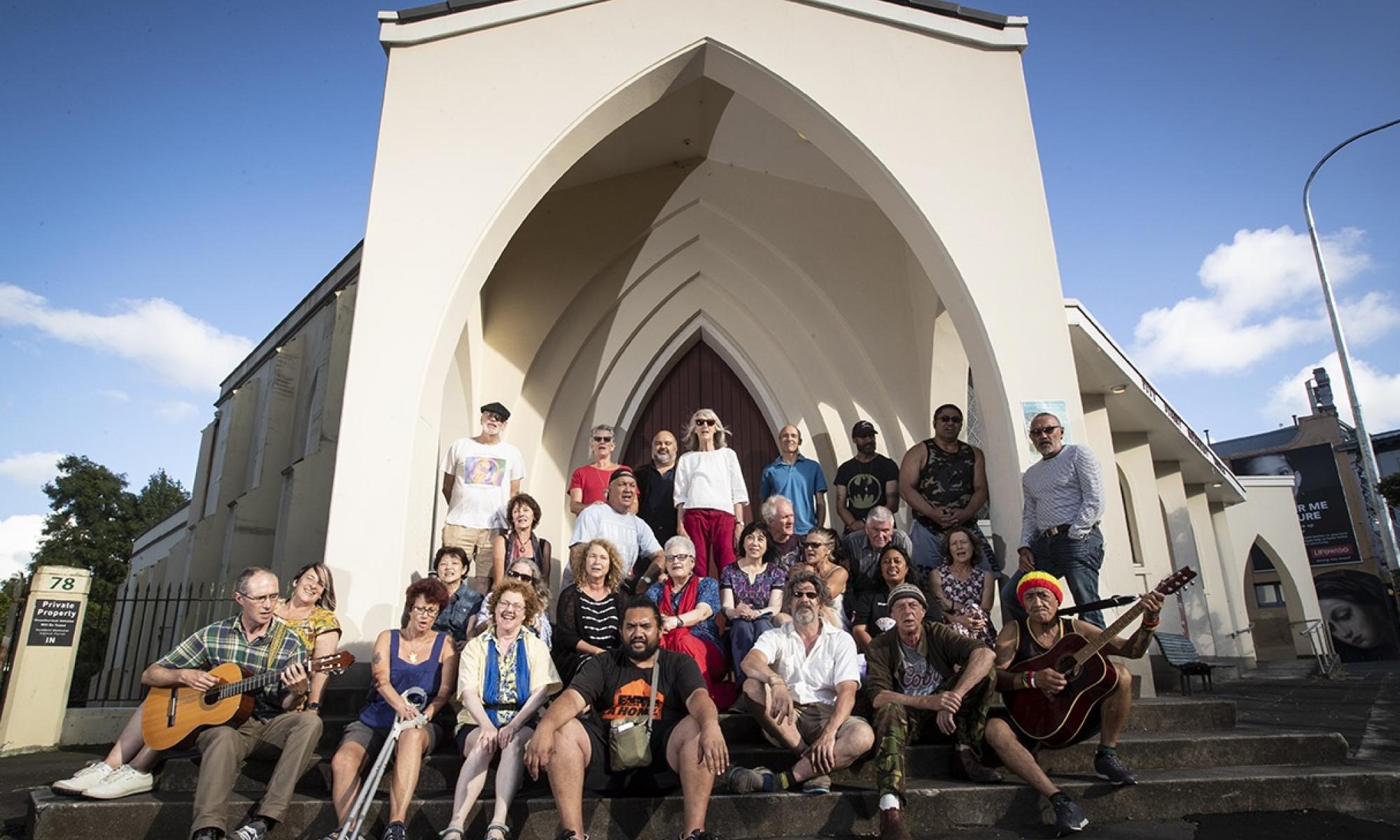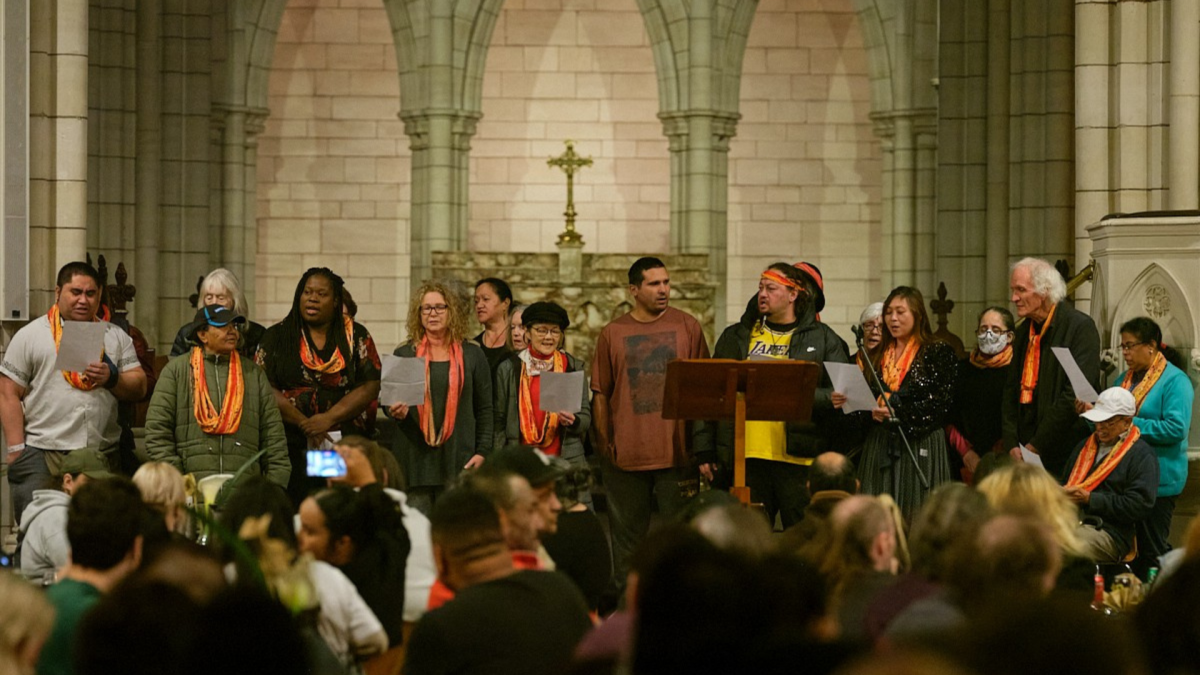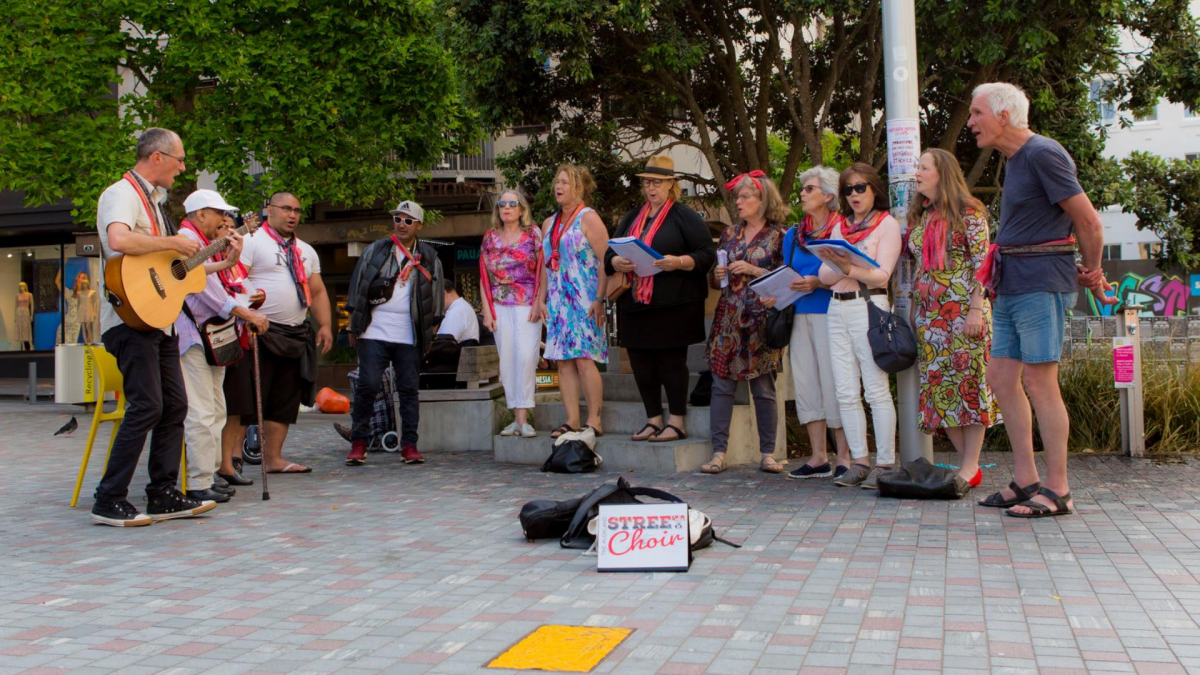'I’ve been in dark places: The Auckland Street Choir is my reset button'

On a Tuesday night at the Pitt Street Methodist Church in the Auckland CBD, the sounds of music fill the air as the Auckland Street Choir gathers to sing and share a meal. This diverse group of individuals, some with homes and some without, find comfort and connection through the power of music.
The Auckland Street Choir provides a platform for vulnerable communities of Auckland/Tamaki Makaurau to find their voices and connect with the broader community. With an open-door, no-audition policy, the choir welcomes anyone seeking a place to sing and be with others. Their repertoire includes a mix of Reggae, Pop, and Rock, with a focus on Māori songs and hymns (Waiata) brought in by choir members celebrating their heritage and maintaining a connection to their culture.
Before the pandemic, the Auckland Street Choir grew steadily to 25 regular members who came together every Tuesday night. The choir gained members through word of mouth, attracting individuals who sought its safe space to sing in a group and enjoy the opportunity for a warm meal and cup of tea. Both homeless and non-homeless individuals found a place of togetherness, gradually forming a strong bond. They shared their voices and performed on various occasions, including performances on Karangahape Road—a place where many “sleep rough”—and at events for the Auckland City Mission, among others.
When the pandemic hit, the choir temporarily lost many of its regular voices.
"It was definitely a struggle through the lockdowns," says Rohan MacMahon, who founded the group in 2015. "We tried to continue meeting via Zoom, but not everyone had internet access." Despite the challenges, the Auckland Street Choir persevered.
As they return to the Pitt Street Methodist Church on Tuesday nights, long-time members are joined by newcomers, forming a diverse group united by the power of music.
Auckland City Choir.png

The Auckland Street Choir performing at the Auckland City Mission's annual cook-off to help raise money for homeless Aucklanders
William, who has been with the choir for over a year, comes to “get out of the house”, connect with others and heal his soul.
“[Singing] is healing,” William says. “You forget about your problems, and you start to focus on what you're doing. It’s like a prayer, you’re here now.”
Shane, a relatively new member of the choir, explains how he stumbled upon this community. "I used to go to a lot of the free meals in town, and bumped into a friend who introduced me. I've been coming here ever since.”
Karen and Lulu, who have been attending the choir for several years, speak to the sense of belonging and friendship that keeps them returning each Tuesday night.
"It's not just the kai, it's a wonderful group of friends who come from all different places and backgrounds, and singing abilities," Lulu explains.
Karen highlights the joy of singing together, stating, "For some reason, we sound pretty good when we get together." Both Karen and Lulu emphasise the mental wellbeing benefits they derive from being part of the choir. "We're like a family, and I really enjoy the fellowship," Karen says.
Ian, a longstanding member of the choir, describes the profound impact the group has had on his life. "I've been in dark places... it's like the reset button, it's like a refresh. Each week it's a refresh," he reflects. Ian also finds solace and personal connections through the songs, especially those that hold deep personal meaning, connecting him to his family and cultural heritage.
Barbara-Grace, who has been part of the Auckland Street Choir since its inception eight years ago, appreciates the inclusive nature of the group. "I don't think I'd be able to sing in a proper choir where you have to be auditioned or anything like that,” she says. “So I think this is my sort of choir."
Harlem and Debbie, two long-time members of the choir, highlight the resilience-enhancing power of music. "You can just see how singing lifts people's spirits and helps them get through their week," says Debbie.
All of these sentiments resonate with the extensive research on the benefits of music and singing in choirs. Singing evolved in many cultures as a mechanism for social bonding, and this is supported by the relationship between singing and the release of feel-good neuropeptides, oxytocin and endorphins. These have both been associated with greater connection and cohesion between members in groups.
Singing has been shown to improve aspects of physical health such as lung capacity and posture, as well as reducing muscle tension. Research indicates that “music has profound effects on the emotions, for example, inducing states of relaxation, which are particularly useful as an antidote to depression, anxiety and fatigue."
It has also been proven that singing in a choir creates a perception of connection and closeness between its members much faster than other creative pursuits done in groups of adults, such as creative writing or making art. Members in a choir have to work together faster, without having to share personal information as much as in other groups.
Untitled design.png

The Auckland Street Choir singing for the big pre-Christmas meal at Ellen Melville Centre
The power of choirs to connect vulnerable groups
In a world where individuals often face various challenges and struggles, the power of choirs and singing emerges as a remarkable force in uniting vulnerable groups.
One such vulnerable population is the homeless community, who often grapple with the lack of stable housing, mental health challenges, addiction and the devastating effects of family violence. In addressing the needs of these vulnerable populations, community support plays a crucial role in creating inclusion and nurturing wellbeing.
Dr Shahram Heshmat, a renowned psychologist, explains that humans have a fundamental need to connect with others and that the release of oxytocin is helpful for vulnerable groups.
"Oxytocin can reduce the pleasure of drugs and feelings of stress,” Heshmat says.
“Participation in musical activities can help individuals who lack self-confidence and trust, and [feel] socially excluded. Thus, making music together should be encouraged during periods of isolation to potentially enhance mental health."
Jeremy Haneman, a choir conductor in the United Kingdom and the son of refugees, believes that “the ultimate antidote to the pain and devastation that comes from being uprooted from one's home lies in being welcomed as part of a community." He recognises choirs as bridges to connections that may not otherwise be possible, allowing individuals to be part of a team and transcend the challenges of daily life by working together on a song.
Dr Ysaye Barnwell, an esteemed musician and scholar, and the director of 'Your Community Sings' at Levine campuses in the USA, has a deep passion for community singing and has dedicated her career to exploring the power and importance of group vocalisation. In a YouTube interview she reflects on the decline of communal singing in modern society: "We don't tend to sing together anymore . . . we used to do that! In camp, we used to do it in school, we used to do it in church, we used to do it in our unions."
She goes on to explain how singing has given disadvantaged groups a sense of power. She uses the example of French citizens coming together after the terrorist bombings in 2016 in Paris. “They came to sing and stand together in the streets to show they would not be defeated by this tragedy,” she says in the video.
Choirs like the Auckland Street Choir have emerged worldwide as beacons of hope and connection for those who lack a stable physical home. These choirs serve as bridges, bringing together individuals from diverse backgrounds and life experiences. They provide a safe space where individuals can come together, share their stories and find solace in the collective power of music.
Listen to the Auckland Street Choir:
If you're looking to create connections and make a positive impact, consider joining a community choir yourself. There are numerous choirs dedicated to various causes, all centred around fostering connections and enriching the lives of their members.
For those in Auckland/Tamaki Makaurau, why not head to the downstairs floor at the Methodist Church on Pitt Street on Tuesday night? The choir practises from 6:00 pm to 8:00 pm. Come and share the uplifting experience of singing in a group for yourself. No choral experience required.
To keep up to date with the Auckland Street Choir and find out where and when they will be performing their next gig, you can follow their Facebook page.










